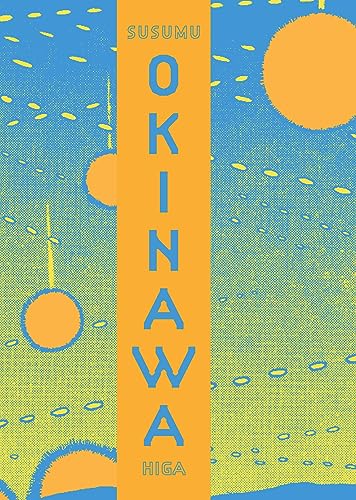Based on a true story of the young conservationist, Chang, who overcomes incredible odds for the sake of saving H’Non, an elephant who must be nursed back to health after years of being forced to move heavy equipment on construction sites and carry tourists to attractions all day with no breaks. A bond develops between Chang and H’Non as she nurses the elephant back to health and she decides to try and return H’Non back to her natural habitat.
Author: Book Importer
Okinawa
 This heartbreaking manga, by an award-winning mangaka, examines the effects of World War 2 and post-war military colonization in Okinawa. An essential manga classic presented in English for the first time.
This heartbreaking manga, by an award-winning mangaka, examines the effects of World War 2 and post-war military colonization in Okinawa. An essential manga classic presented in English for the first time.
Okinawa is the WOW Recommends Book of the Month for April 2024.
Letters In Charcoal
A young narrator recounts learning to read with the help of Señor Velandia, the owner of the village shop, so she can unlock the messages her older sister, Gina, receives from a young doctor each month. In doing so, she will change her life, as well as the lives of every child in the pueblo of Palenque Colombia. Inspired by stories told to the author by Colombian women, Letters in Charcoal celebrates the freedom to read and the joy reading can bring by adding light for a brighter future.
The Art And Life Of Hilma Af Klint
Hilma af Klimt was born in Sweden in 1862. She would grow up to be an artist, and her life would be filled with magic and mystery. Hilma lived at a time when people were fascinated by what they couldn’t see. The invention of the telegraph and telephone made it possible to communicate over long distances, and spiritualists believed it was possible to speak with the dead. When Hilma began to hear the spirits, she found a new purpose for her paintings. For nearly one hundred years her paintings were forgotten, but when they were rediscovered they changed the history of art.
Featured in WOW Review Volume XVI, Issue 2.
Savage Her Reply
A dark, feminist retelling of the Irish fairytale, “The Children of Lir”, told through the voice of Aife. When Aife marries King Lir, he already has four children from his previous wife. Out of jealousy of a father’s love for his children, Aife turns King Lir’s children into swans for 900 years. What will become of them?
The Moon Is A Ball: Stories Of Panda & Squirrel
Join best friends, Panda and Squirrel, in nine stories about the importance and meaning of friendship. Whether they are lying on rocks to look up at the moon, taking walks or playing games, Panda and Squirrel do everything together. On some days they argue, but they always make up. With full-color illustrations by world-leading illustrator for children and Hans Christian Andersen nominee, Tjong-Khing, and written by one of Belgium’s most important and innovative children’s authors, Ed Franck, The Moon is a Ball is sure to delight young readers again and again. Perfect for emerging readers and reading aloud.
A Daydreamy Child Takes A Walk
Even though he has promised his mama he will stay focused, Little Giovanni cannot help but continue to daydream and pay attention to the smaller, more wonderous, details of the world around him. Written by the father of modern Italian children’s literature, Gianni Rodari, with a Batchelder Award winning translation by Antony Shugaar, A Daydreamy Child Takes a Walk is beautifully illustrated by New York Public Library Best illustrator, Beatrice Alemagna and is sure to delight young readers with its assertion of the power and value of childlike wonder.
Who Will Make The Snow?
Purr and Craw, twin moles born on the first day of spring, learn to dig themselves out of their comfort zones and experience the vast and unpredictable world around them. Indeed, they are curious about everything and ask endless questions. What is swimming? Do animals live in the sea? Why does mother speak French when she makes pancakes? No matter where or how far they go in the forest as they pursue answers, home is always waiting for them.
Corner
A crow finds itself alone in an empty corner in this (almost wordless) picture book. With only thoughts for company, the crow begins to pass the time by filling the empty space with furnishings and hobbies. But even after all the decorating, which includes a growing plant and wall-to-ceiling art, there is still something missing. Finally, the crow adds a window and discovers the need to connect with the world outside. The need for friendship.
The Night Raven (The Moonwind Mysteries)
Stockholm winter 1880: twelve-year old Mika knows that it will be a struggle for everyone in the orphanage to survive this winter. To everyone’s shock, a newborn baby is left at the orphanage in the middle of the night with a cryptic message. Who is this baby boy? Where did he come from? And who is the “Dark Angel”? Meanwhile, there is an ease of mind knowing that the notorious serial killer, known as the Night Raven, is finally off the streets… or is he? Enter Detective Hoff who recruits Mika because of her ability to notice small details – a skill she credits for her ability to survive. He is investigating a gruesome murder and needs Mika’s help. With such little hope for the future, Mika questions if this could be an opportunity, or maybe, just maybe, a chance to be someone who matters.
